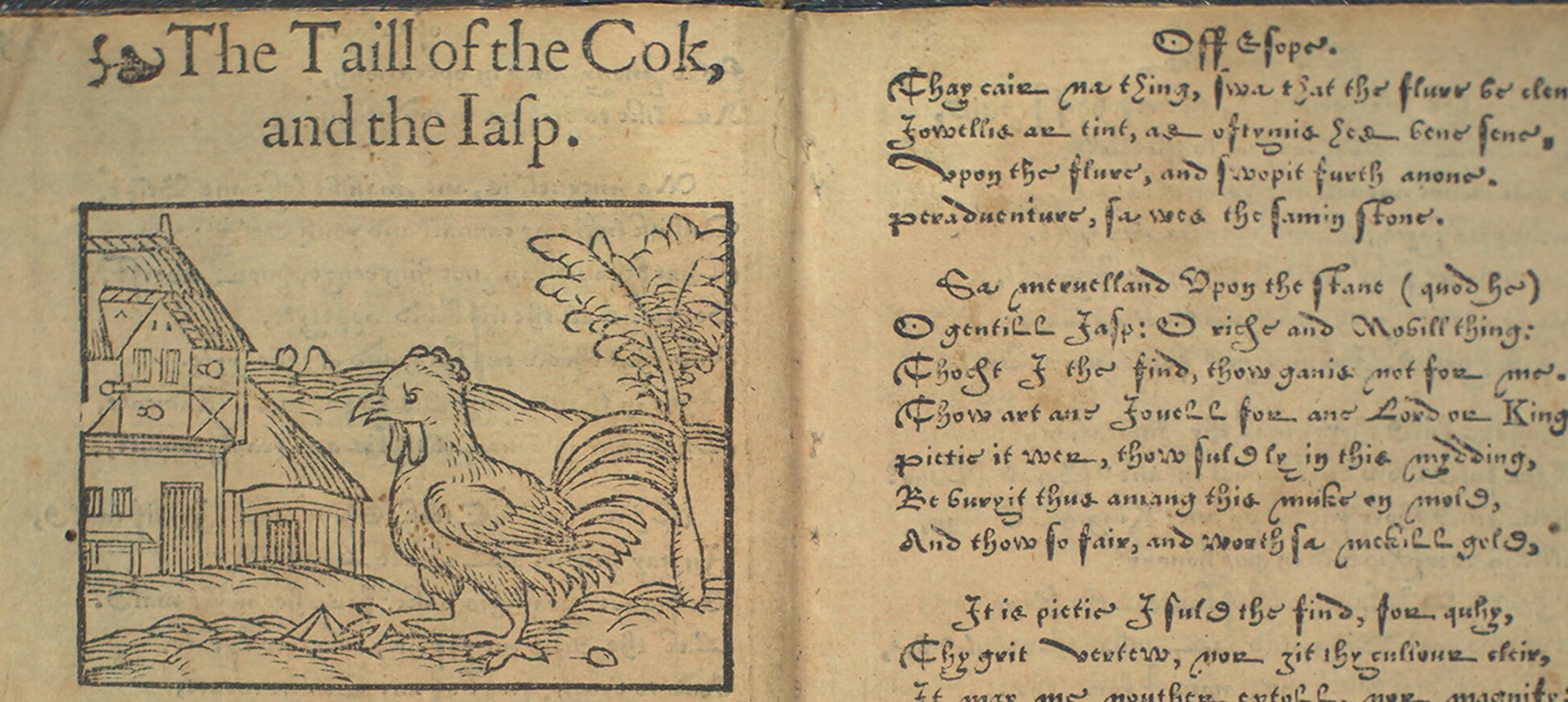The Read Older Scots project aims to develop a suite of multimedia resources for teaching Older Scots literature – texts, translations, authoritative introductions, audio recordings, videos, guides to further resources. Eventually there will even be interactive web app for learning to read Older Scots! All will be available freely from this website.
The first two teaching packs will be on the very first surviving work of literature written in Scots: The Bruce, John Barbour’s epic poem of c. 1375 celebrating the career of Robert the Bruce, king of Scotland and victor of the Battle of Bannockburn (1314).
Pack 1: ‘Barbour’s Bruce: The Fox Fable’. In 1327, Bruce’s right-hand man Sir James Douglas is leading a raiding party into England with the earl of Moray when they find themselves cornered by the vast English army. What should they do? Douglas explains his strategy to Moray through this fable of the fox and the fisherman, read in our video by Clive Russell. Full video coming soon, but here is a sneak preview!
The Fox Fable from Bill Bruce on Vimeo.
Pack 2: ‘Barbour’s Bruce: “fredome is a noble thing!”‘ This is built around the parts of Barbour’s poem used as the libretto for a modern opera ‘The Bruce: Cathedral Opera’ by composer Rakbat-Bi Abdyssagin, which will have its world premiere tour in Scotland from 17 February to 3 March 2024. What inspired this composer from Kazakhstan to use this fourteenth-century Scottish poem for his modern opera? Full video coming soon, but see the trailer for the opera here!
THE BRUCE Cathedral Opera from Bill Bruce on Vimeo.
ROSc Editorial Board
The Board’s combination of Scottish secondary school teachers of English and/or the Scots Language Award, and academics working in the fields of pre-Modern Scots literature, language and culture, is designed to ensure the materials developed are both academically sound and fit for the modern classroom.
Secondary School Board Members
Mrs Diane Anderson, Morgan Academy, Dundee
Mr Steve Dornan, Cults Academy, Aberdeen
Dr Jamie Fairbairn, Banff Academy
Dr Johnny Finnigan, Gleniffer High School, Paisley
Mrs Kerry Fraser, Perth High School
Ms Laura Green, Scots Language Centre
Ms Kirsty McRoberts, Linwood High School, Paisley
University Board Members
Dr Elizabeth Elliott, University of Aberdeen
Dr Kate Ash-Irisarri, University of Edinburgh
Professor Joanna Kopaczyk, University of Glasgow
Professor Alasdair MacDonald, University of Groningen emeritus
Professor David Parkinson, University of Saskatchewan emeritus
Professor Don Paterson, University of St Andrews emeritus
Professor Rhiannon Purdie, University of St Andrews
Professor Nicola Royan, University of Nottingham
Professor Jeremy Smith, University of Glasgow emeritus
Dr Theo Van Heijnsbergen, University of Glasgow
Background
Originally dubbed ‘Older Scots for Modern Scots’, this initiative was set up in the spring of 2020 to explore how best to (re)introduce Older Scots literature to the Scottish secondary school classroom, whether as options for the SQA Higher and/or Advanced Higher English award, as additional resources for the SQA Scots Language or Scottish Studies Awards, or just to give teachers at S1-3 something different to try on a rainy Friday afternoon. It is run by Rhiannon Purdie in consultation with with the SQA.
Higher and Sixth Year Studies English papers had included options to study a handful of Older Scots texts through the 1990s (Robert Henryson’s Moral Fables or The Testament of Cresseid, and Sir David Lyndsay’s Ane Satyre of the Thrie Estaitis), but uptake was low and by the mid 2000s they had been quietly dropped from the syllabus. On the most recent list of Scottish texts set for the Higher English courses, the only pre-1900 texts are Robert Louis Stevenson’s Dr Jekyll and Mr Hyde (1886) and a handful of poems by Robert Burns (published 1786-96). Nothing in Older Scots, and therefore nothing of the national literature of the independent kingdom of Scotland. The majority of modern schoolteachers of literature have never encountered Older Scots texts and thus may not feel confident to attempt them. Teachers of Scots Language will of course be familiar with Older Scots since the language’s history and development is a required component of the Scots Language Award, but resources to help students read and enjoy Older Scots texts are nevertheless thin.
In early 2022 the OSMS Initiative conducted interviews with volunteer secondary schoolteachers of either English of Scots Language studies. This was to give us a better sense of the barriers to teaching such texts, and what kinds of resources would best help to overcome them. We’re very grateful to all our interviewees for their many suggestions, cautions and also their enthusiasm for literature in Scots, whether old or modern.
If you’re a Scottish schoolteacher who missed the first phase of interviews but would still like to respond or participate, please feel free to complete the original OSMS Questionnaire (the set of questions around which interviews were based) and email it back to us. See also the original Participant Information Sheet and OSMS Participant Advert.

